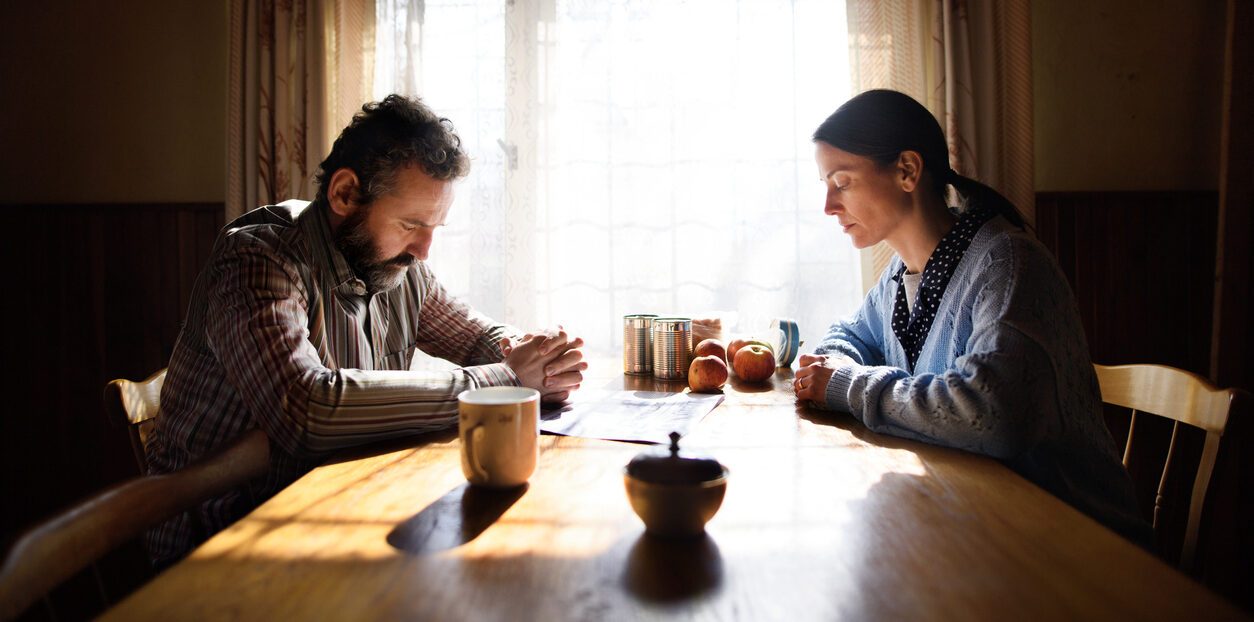Sexual Intimacy: Revitalize Connection in a “Roommate” Marriage
This article is based on scientific evidence and clinical experience, written by a licensed professional and fact-checked by experts.
Posted: October 6, 2022
Estimated reading time: 7 minutes
In This article

You are no longer having regular, enjoyable sexual experiences with your spouse. It feels like your marriage is in a rut, and you do not know how to get out. It has been months or years since you had a connective, sexually intimate time with your partner. The goal of this article is to put sex back on the table again – to be able to have an open conversation with your spouse about the state of your sex life.
A marriage that is noticeably missing intimacy and connection is miserable. If you find yourself in a roommate marriage, know you are not alone. This is the third part in a series designed to help bring a deeper sense of intimacy back into your marriage – to go from feeling like roommates to husband and wife. Here are the previous installments on cultivating emotional intimacy and physical intimacy.
Why Sexual Intimacy is Important
Sexual intimacy is an important part of a marriage relationship. Our current culture both idolizes and cheapens sex – glamorized and filtered in romantic chick flicks, and often oversimplified in music and media. It can be difficult to navigate the ups and downs of sexual desire in a longterm, committed relationship. If you have experienced sexual intimacy creating conflict and disconnection between you and your partner, this article is for you.
Issues in sexual intimacy can be a source of shame in your relationship – leaving you feeling you or your partner is broken or not good enough. It can lead to feelings of failure and loneliness. It can also lead to conflict and disconnection that reflect deeper issues in the relationship.
My aim is for you to leave this article feeling a renewed sense of hope for you and your partner. I want you to feel empowered to have an open dialogue with your spouse about putting sex back on the table – without the conversation devolving into a heated argument.
First, we will foster a mindset conducive to an open conversation. Second, we will identify some common blocks and barriers that need to be addressed in order to move forward. Third, we will list practical ways to have an open conversation with your partner about sex.
Special bonus: At the end of this article is a list of resources you and/or your partner can use to improve sexual intimacy in your marriage.
The Mindset
In having a conversation about sex with your partner, the focus should be on mutual feelings of safety and pleasure. Imagine an ideal sexual experience you would like to have with your partner. Rather than focusing on the specific positions or locations, what do you notice about what you are feeling in this experience?
- Intense pleasure
- Connection with your spouse
- Joy
- Sense of safety
- Ecstasy, etc.
Now, in this imaginary sexual experience, what is your partner experiencing? Imagine how awesome it would feel to know and see that your partner is experiencing the same level of pleasure and connection with you. That sense of oneness, connection, and pleasure is what we want to cultivate.
In order to have a conversation that feels safe and open about sex, it is important to have a mindset shift. It is challenging to have conversations about sex when sex is not going well. Let’s avoid some common pitfalls when talking about sex.
- Focusing on frequency. This is when the conversation turns into a diatribe about the lack of sex in the marriage and when we focus on a specific number that is “healthy.” Over time, this can create an atmosphere of dread surrounding initiating and partaking in sexual experiences. This leads to a “ticking clock” in the back of you and your partner’s mind that says, “Oh, we have to have sex tonight.”
- Threats of masturbation, pornography, or turning elsewhere. When it feels like your partner is not hearing you, it is not helpful to threaten to go outside of the marriage to experience a release. This can create a dynamic in which your spouse feels backed into a corner. Even if your spouse decides to have a sexual experience with you, it will be out of a place of fear or a sense of coercion. This is not the dynamic we want to set up.
- Turning sex into a male vs. female issue. The message that men need more sex than women can actually be very damaging to sexual intimacy in a marriage. It can create a pattern of sex that values the male’s pleasure over the female’s pleasure. This can further feelings of shame in both partners, and can lead to sex that is fear-based. When wives are having sex with their husbands primarily for the husband’s pleasure, it can lead to “going through the motions” rather than fostering increased connection and pleasure for both partners. When men are experiencing lower desires for sex than their wives, it can lead to increased feelings of shame when culture says men should always have the higher drive.
Blocks and Barriers
It is crucial to acknowledge and notice blocks to sexual pleasure and safety in your marriage. If you do not address these, you will continue to run into them. Here are some common blocks that need to be dealt in order to create the space for pleasure and safety to take root:
- Physical pain. If there has ever been physical pain present during sex, it can negatively impact desire for sex and pleasure during sex. If you or your partner has experienced pain, it is important to know that there was a wiring that took place in your brain that linked sex with pain – and of course it would be normal to experience a decrease in desire for sex.
- It is also normal to not be able to convince yourself that sex is good, desirable, etc. Again, because sex has been linked to pain in your brain, it will require intentional care to help rewire to link sex with pleasure.
- If pain is currently a barrier in your relationship, set up an appointment with a medical professional (i.e. OB/GYN). I have also included the book, When Sex Hurts in the list of resources at the end of this article. Finally, please, seriously consider scheduling an appointment with one of our counselors trained in providing sex therapy to couples.
- Shame. Feeling disgust, unease, or discouragement surrounding sex will limit your ability to fully experience pleasure and safety with your partner. There can be shame surrounding sex itself, different sexual practices, your body, and/or specifically shame toward your genitals.
- All of these areas are important, and feeling disgust or shame due to past abuse, previous relationships, religious doctrine, or past trauma can have a devastating impact on your ability to experience pleasure and safety in your sexual relationship with your spouse. There is hope for you. Again, I highly recommend seeking a safe, qualified counselor to walk with you and your spouse as you seek to reconnect with yourself, your body, and your spouse.
- Addiction. An addiction of any kind impacts feelings of safety and trust in a relationship. In this article, I am specifically highlighting pornography and masturbation. Being able to ask for and receive safe, pleasurable sex from your partner takes vulnerability and courage.
- It is not easy to put yourself out there, to risk rejection and pain. However, an addiction sucks the safety and trust away from your partner in many ways. Addiction comes with deceit, lies, secrets – a posture of hiding yourself and your actions from your partner, from others, and from God.
- You lose your sense of freedom and your sense of integrity. Complete intimacy is impossible when there are secrets lurking beneath the surface of your relationship. If you are struggling with an addiction, I recommend the book, Unwanted (listed in Resources), and I also recommend you seek a safe, wise person of the same sex to walk with you. If you do not have a safe person you can share these things with, find a counselor.
How Do I Start The Conversation?
I want to leave you with some practical pieces for having this conversation with your partner. These conversations are difficult, because there are so many different dynamics at play. These are guidelines, not rules.
- Create intentional space and time for this conversation.
- Make sure kids are settled.
- Pick a quiet and calm atmosphere (outside, restaurant, living room).
- Set realistic expectations.
- Decide ahead of time that if things feel like they are escalating or becoming unsafe in any way, you will say “Hey, it’s okay. Let’s revisit this at a different time.”
- Acknowledge ways this conversation and sexual intimacy have been a struggle in the past.
- Highlight the ways you have responded poorly in the past.
- List ways you know your actions/words have caused pain or feelings of distrust.
- Go slowly and gently.
- The topic of sex can be very painful. Focus on validating your partner’s pain, and openly acknowledge your own feelings of fear and nervousness about broaching this topic.
- Validate your partner, and lead with compassion.
- Clearly state how you want sex to feel for you both.
- As you delve into this topic, remember there are potentially wounds and sensitive areas that you may be unaware of for your partner. Look for opportunities to be patient and encouraging to your partner.
- Let your partner know how important it is to you that your partner experiences safety, connectedness, and pleasure.
- Leave space for dialogue.
- Listen to your partner’s concerns,
- Notice areas of fear.
- Suggest possible solutions.
- See if partner would be open to reading a book with you, speaking with a medical professional, or seeing a counselor.
There is hope for sexual intimacy in your marriage. This article has outlined practical ways you can kickstart a conversation with your partner about sex and intimacy. It is important to honor the wounds and experiences that took place in the past to lead you to your present. As you begin to put this conversation back on the table, it is my hope that you will lead from a place of vulnerability, humility, and sensitivity.
These conversations are very challenging and can require more from us than we are able to give. It can be incredibly helpful to have a trained professional counselor walk alongside you and your partner as you begin to broach the subject of sex.
Back to topThis article is based on scientific evidence and clinical experience, written by a licensed professional and fact-checked by experts.
About the Author

Danielle Schaefer
Danielle Schaefer M.MFT, LMFT-A, has Bachelor’s degrees in Psychology and Family Studies and in Biblical Studies. She has a Master’s in Marriage and Family Therapy. She is a Licensed Marriage and Family Therapist Associate, holding licensure in Ohio.
Learn More About DanielleIn This article
References
- When Sex Hurts: A Woman’s Guide to Banishing Sexual Pain By Goldstein, Pukall, and Goldstein
- Unwanted: How Sexual Brokenness Reveals our Way to Healing By Jay Stringer
- Total Intimacy: A Guide to Loving by Color By Deborah Neel and Douglas Rosenau
Share this article
View more articles

How to Revitalize Connection in a “Roommate” Marriage: Pt. 2 Physical Connection
By: Danielle Schaefer







